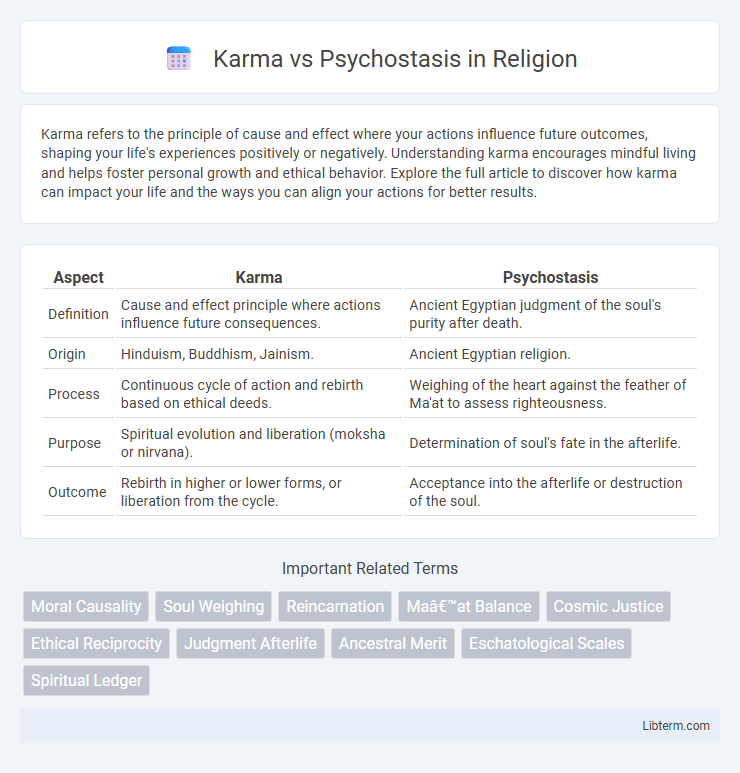Karma refers to the principle of cause and effect where your actions influence future outcomes, shaping your life's experiences positively or negatively. Understanding karma encourages mindful living and helps foster personal growth and ethical behavior. Explore the full article to discover how karma can impact your life and the ways you can align your actions for better results.
Table of Comparison
| Aspect | Karma | Psychostasis |
|---|---|---|
| Definition | Cause and effect principle where actions influence future consequences. | Ancient Egyptian judgment of the soul's purity after death. |
| Origin | Hinduism, Buddhism, Jainism. | Ancient Egyptian religion. |
| Process | Continuous cycle of action and rebirth based on ethical deeds. | Weighing of the heart against the feather of Ma'at to assess righteousness. |
| Purpose | Spiritual evolution and liberation (moksha or nirvana). | Determination of soul's fate in the afterlife. |
| Outcome | Rebirth in higher or lower forms, or liberation from the cycle. | Acceptance into the afterlife or destruction of the soul. |
Introduction to Karma and Psychostasis
Karma, rooted in ancient Indian philosophy, refers to the universal principle of cause and effect, where every action influences future outcomes, shaping an individual's destiny. Psychostasis, a lesser-known concept, explores the balance of the soul's moral and psychological weight, often representing the metaphysical judgment of one's actions and intentions. Understanding the interplay between Karma and Psychostasis provides insights into ethical accountability and spiritual equilibrium across various belief systems.
Historical Origins of Karma and Psychostasis
Karma, rooted in ancient Indian religions such as Hinduism, Buddhism, and Jainism, originated around 1500 BCE as a concept to explain moral causation and the cycle of rebirth. Psychostasis, emerging from ancient Egyptian beliefs, refers to the weighing of the soul against the feather of Ma'at in the afterlife, symbolizing divine judgment and moral balance. Both concepts developed independently, reflecting early human attempts to understand justice, morality, and the consequences of actions in metaphysical contexts.
Core Philosophical Differences
Karma centers on the ethical principle of cause and effect, emphasizing moral actions and their consequences across lifetimes, rooted in Hindu, Buddhist, and Jain traditions. Psychostasis, a less commonly discussed concept, involves the balance of the psyche or soul, highlighting inner equilibrium and spiritual weighing rather than external moral causality. The core philosophical difference lies in karma's focus on external karmic law governing rebirth and justice, contrasted with psychostasis's emphasis on internal psychic harmony and spiritual judgment.
How Karma Shapes Personal Responsibility
Karma shapes personal responsibility by emphasizing that every action generates consequences, reinforcing accountability for one's choices and behaviors. It instills a moral framework where individuals recognize their role in influencing their destiny through intentional actions and ethical conduct. This principle contrasts with Psychostasis, which centers on balancing mental states and does not directly dictate cause-and-effect moral accountability.
Psychostasis: Ancient Notions of Soul Weighing
Psychostasis, an ancient ritual of soul weighing, symbolizes the judgment of a person's moral and spiritual worth after death, predominantly found in Egyptian mythology where the heart is weighed against the feather of Ma'at. Unlike karma, which revolves around a cosmic cycle of cause and effect influencing future lives, psychostasis centers on a definitive post-mortem assessment determining one's fate in the afterlife. This concept emphasizes equilibrium and justice, reflecting a belief in an immediate ethical reckoning rather than cumulative spiritual consequences over multiple lifetimes.
Karma in Eastern Religions
Karma in Eastern religions such as Hinduism, Buddhism, and Jainism represents the law of moral causation where every action influences future outcomes across lifetimes, emphasizing ethical behavior and spiritual progression. It operates as a fundamental principle governing samsara, the cycle of birth, death, and rebirth, where positive deeds lead to favorable rebirths while negative actions result in suffering or lower realms. Unlike Psychostasis, which is often associated with judgment and balance in Western esoteric traditions, Karma functions dynamically within cosmic order, ensuring moral accountability through natural consequences rather than divine decree.
Psychostasis in Egyptian Mythology
Psychostasis in Egyptian mythology refers to the divine weighing of the soul against the feather of Ma'at to determine the deceased's fate in the afterlife. This judgment process ensures that only those with a balanced heart, symbolizing truth and justice, enter the eternal realm, while unworthy souls face oblivion. Unlike Karma, which emphasizes actions affecting future lives, Psychostasis centers on the moral purity assessed immediately after death.
Ethical Implications: Justice and Morality
Karma emphasizes ethical causality where actions inherently generate corresponding moral consequences, reinforcing individual responsibility and justice in personal growth. Psychostasis, rooted in ancient Egyptian belief, represents a divine moral judgment weighing the soul's deeds, underscoring a spiritual ethical framework tied to cosmic order and balance. Both concepts highlight justice and morality but diverge in mechanism--Karma operates as an automatic ethical law, while Psychostasis involves an external evaluative process determining moral righteousness.
Modern Interpretations of Karma and Psychostasis
Modern interpretations of Karma emphasize its role as an ethical cause-and-effect principle shaping personal growth and social justice, often integrating psychological and spiritual dimensions. Psychostasis, reinterpreted in contemporary contexts, symbolizes inner balance and moral judgment, reflecting an individual's alignment between actions and conscience. Both concepts converge in modern discourse as frameworks for understanding accountability and ethical decision-making in human behavior.
Comparative Analysis: Karma vs Psychostasis
Karma operates as a spiritual law of cause and effect, emphasizing moral actions and their future consequences, deeply rooted in Hinduism, Buddhism, and Jainism. Psychostasis, derived from ancient Greek philosophy and mysticism, refers to the balance or weighing of the soul's deeds during the afterlife judgment, focusing on the moral evaluation for reincarnation or ascension. Comparative analysis reveals Karma as a continuous, self-driven ethical cycle influencing future lives, while Psychostasis serves as a metaphysical judgment point determining the soul's fate post-mortem, highlighting differing cultural approaches to morality and afterlife.
Karma Infographic

 libterm.com
libterm.com